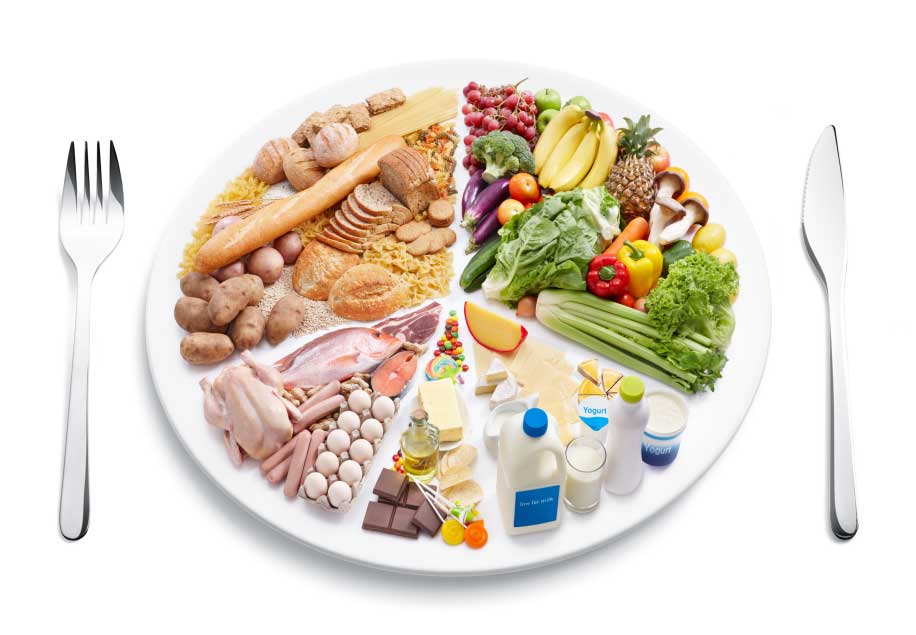Nutrition
Tips for healthy eating
Following a healthy diet, exercising moderately and not smoking may help prevent the development of some types of cancer.
What can be eaten and what should be avoided?
Let us imagine to divide a plate into several slices, each corresponding to a different food group.
The width of each slice is proportional to the relevance of that food for a daily healthy diet


Cereal grains
Cereal grains include wheat, rice, corn, barley, and farro. Half of our daily carbohydrate intake should consist of wholegrain cereals, because they contain fibre (that regulates bowel activity and protects from bowel cancer and cardiovascular diseases) and a higher quantity of vitamins, especially B-group vitamins, and minerals such as iron, magnesium and selenium. In the morning, cereal grains can be eaten in the form of wholemeal cakes or biscuits, cornflakes or oats porridge. At lunch, you can have rice or pasta with vegetables, while the evening meal can include vegetables again (to increase fibre intake) and a protein-rich food: meat, cheese, eggs or fish

Vegetables
Vegetables plays a major role in the food pyramid, and therefore they should be eaten in large amounts: cooked, raw, or in the form of juices and extracts. Among the many benefits associated with vegetables is the amount of fibre they provide to our body, which promotes bowel transit and protects from bowel cancer, and the high content of anti-oxidant vitamins and minerals such as potassium (which helps maintain bone mass, keeps blood pressure at low levels and prevents kidney stones). For a healthy, balanced diet, people should consume at least five servings of different fruits and vegetables daily. Therefore, it is suggested to eat vegetables also between meals and to include them in the preparation of other recipes, for example sauces for pasta dishes.

Fruits
Fruits contain fibre, potassium and anti-oxidant vitamins, especially Vitamin C. It is recommended to eat 2-3 servings of fruits daily, in addition to the 2 servings of vegetables. Dried fruits should be consumed in reduced amounts, because they are richer in calories than fresh fruits. To optimize absorption, fruits should be eaten between or before meals.

Fats
Extra virgin olive oil is by far the healthiest fat of all, because it is rich in polyunsaturated fatty acids. On the other hand, butter and solid fats such as margarine should be avoided because they contain large quantities of saturated fatty acids or trans fats, which tend to increase the levels of “bad” (LDL) cholesterol in the blood.

Dairy products
The group of dairy products includes milk and its by-products, provided that they are rich in calcium. This means that butter and other very creamy types of cheese, which contain a limited amount of calcium, do not fall into this group. A balanced diet should include partly skimmed milk and low-fat cheese, because they have the same amount of calcium but less fat and calories. Since milk and cheese contain calcium, potassium and Vitamin D, dairy products are essential for the formation and maintenance of bone density. In any case, as they are fat and high-calorie foods, excessive consumption should be avoided.

Proteins
This group includes several types of food: meat, eggs, fish and legumes. Legumes fall into both the proteins group and the vegetables group, because their properties are common to both food categories. Not all proteins are the same: meat should be consumed no more than twice a week, and may be replaced with eggs (once a week) and fish and legumes (all other days). Meat and poultry should be consumed choosing lean cuts, and red meat should be eaten only occasionally. As regards fish, it is advisable to alternate lean fish (oily fish such as sardines, mackerels and anchovies) with fat fish (salmon) that contain higher amounts of Omega-3 fatty acids which have a protective effect against several types of cancer and cardiovascular diseases.
Contact

Via G.B. Giorgini 16 - 20151 Milano
Tel. 02.3343281 - Fax 02.33496370
email: effetti@effetti.it
web: www.effetti.it - www.makevent.it
Forgotten password
Please enter your email address to receive a message with instructions to recover your login credentials.



